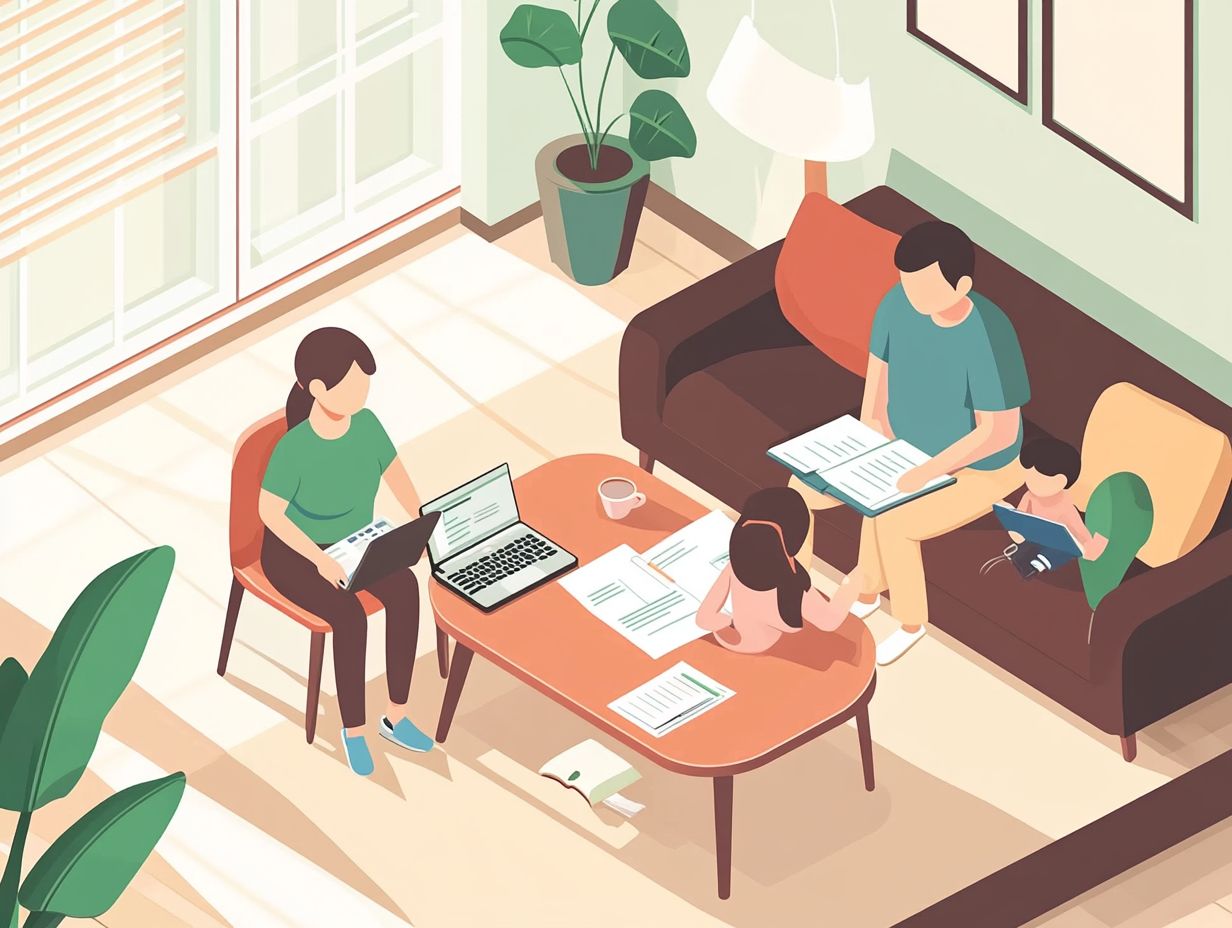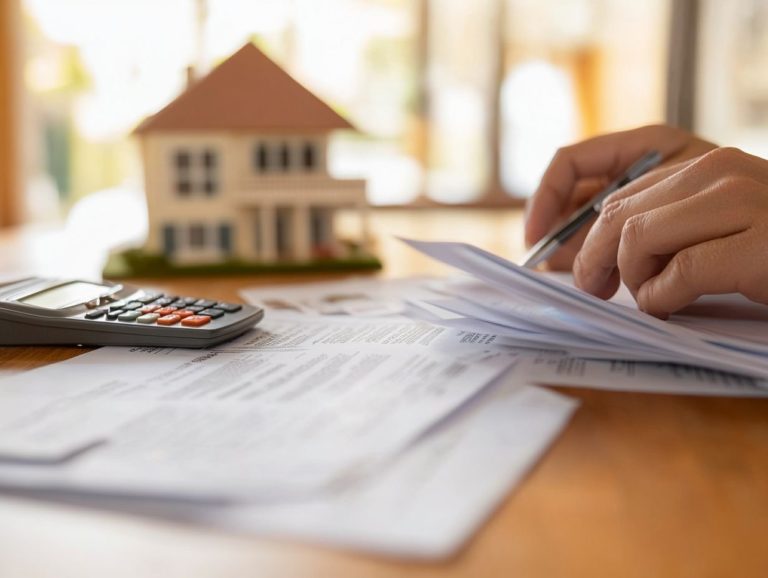How to Lower Your Home Insurance Premium?
Understanding home insurance premiums may initially feel overwhelming, yet it’s crucial for homeowners like you who are eager to save money.
This article delves into the key factors influencing premium rates and presents practical tips for lowering costs. By considering strategies such as increasing deductibles, improving home security, bundling policies, and maintaining a solid credit score, you can effectively reduce your premiums.
You’ll also discover common pitfalls to sidestep and gain insights on the best times to review your policy. Prepare to take charge of your home insurance expenses and secure the best value for your investment.
Contents
Key Takeaways:
- Consider increasing your deductible to lower your home insurance premium. This means you will pay more out-of-pocket in case of a claim, but your monthly premiums will be lower.
- Improving your home’s security, such as installing a security system, can help lower your insurance premium.
- Bundling your insurance policies with the same provider can often lead to a discount on your home insurance premium.
Understanding Home Insurance Premiums
Understanding home insurance premiums is essential for homeowners who want to secure the best financial protection for their properties.
Homeowners insurance is crafted to protect against a range of risks, and rates can fluctuate significantly based on various factors, including property value, claims history, and specific coverage needs.
By grasping how insurance companies determine these premiums, you can make informed decisions when comparing quotes from different providers. This guide illuminates the factors that influence homeowners insurance costs and offers insights on optimizing your premiums while ensuring you have the coverage you need.
Factors that Affect Premium Rates
Several factors influence your homeowners insurance premium rates. These include your property’s location, your claims history, and the risk factors assessed by the insurance department.
Understanding these elements is crucial for maintaining an adequate homeowners policy while potentially lowering your costs.
Your credit history plays a significant role in determining your premium rates; insurers often see a higher credit score as a sign of lower risk.
Installing home security features, such as burglar alarms and smoke detectors, can significantly reduce your premiums by mitigating potential hazards. By taking these steps, you not only make your home safer but also show insurers that you are committed to minimizing risks, which is crucial when considering how to prepare for a home insurance renewal.
Choosing the right insurance agent can greatly impact your experience in navigating the insurance marketplace, ensuring that you are well-informed and adequately covered while also securing the best possible rates.
Ways to Lower Your Home Insurance Premium

Lowering your home insurance premium isn’t just a possibility; it’s a smart move for homeowners keen on optimizing their financial commitments. Learning how to make your home insurance more affordable can significantly help in this process.
By strategically employing methods like raising your deductibles, improving home security, and bundling insurance policies, you can learn how to lower your home insurance premium and achieve substantial reductions without compromising essential coverage.
It’s all about making informed choices that benefit both your wallet and your peace of mind.
1. Increase Your Deductible
One effective way to reduce your homeowners insurance premium is by increasing your deductible, which is the amount you pay before your insurance helps. Understanding what factors affect home insurance premiums can also help you make informed decisions.
By raising your deductible, you could significantly lower your premium costs, enhancing your overall savings. This strategy can be especially beneficial if you re financially equipped to handle the higher upfront costs in case of a claim.
If you live in a disaster-prone area, opting for a higher deductible might allow you to enjoy lower monthly premiums, freeing up funds that you can invest in emergency preparedness measures. It s all about finding the right balance.
While lower premiums can provide immediate relief for your household budget, it s vital to ensure that the deductible remains manageable. This thoughtful approach not only helps maintain adequate financial protection against significant damages but also ensures you can enjoy peace of mind without overwhelming financial strain.
Act now to start saving on your home insurance premiums!
2. Improve Your Home’s Security
Improving your home’s security gives you peace of mind and can lead to lower insurance premiums. Investing in security systems and fire alarms enhances safety, which insurance companies often reward.
Install monitored security cameras, motion-sensor lights, and reinforced door locks. These upgrades deter theft and help protect against disasters like fires and floods.
A comprehensive home security system or smart home technology not only protects your property but can also reduce costs over time. Insurance companies recognize these proactive steps and are likely to offer discounts.
Security investments are smart for both your peace of mind and your finances.
3. Bundle Your Insurance Policies

Bundling your insurance policies is a smart move for homeowners who want to simplify their coverage and save money. Many providers offer discounts when you purchase homeowners insurance alongside other policies, like auto or flood insurance.
This approach not only cuts the overall cost of your premiums but also makes managing various policies simpler. You ll enjoy the convenience of having just one contact for claims and policy inquiries, saving time and reducing stress.
Take the time to shop for quotes, as this can reveal competitive bundling options you may not have considered. By comparing offers, you can find the best deals for your needs, ensuring comprehensive coverage at a lower cost.
4. Maintain a Good Credit Score
Keeping a strong credit score is crucial because it significantly affects your homeowners insurance rates. Insurers often see credit history as a risk factor, making financial stability essential.
A robust credit score indicates you manage your finances well, which can lead to lower premiums. If you keep debts in check and pay your bills on time, you could enjoy better rates than those with poorer credit histories.
To boost your credit score, it’s wise to:
- Regularly review your credit reports for inaccuracies.
- Pay down outstanding debts.
- Make timely payments consistently.
By using credit responsibly and keeping utilization low, you can improve your financial profile and secure more affordable coverage.
5. Make Home Improvements
Making home improvements can significantly impact your homeowners insurance premium. Upgrades can increase your property’s value and improve its disaster resistance.
Improvements like modern electrical systems, updated plumbing, and storm shutters not only enhance safety but may lower insurance costs. To maximize your savings, it’s important to know how to prepare for a home insurance renewal. Energy-efficient appliances can also make your home more appealing, potentially leading to premium discounts.
Replacing your roof with durable materials can provide extra protection against severe weather, reducing risks that insurers consider.
Integrating smart home technology allows you to monitor security systems and environmental conditions remotely, enhancing overall safety. These thoughtful upgrades provide a tangible return on investment, increasing property values and fortifying your home against unforeseen events, ultimately giving you peace of mind.
6. Shop Around for the Best Rates

Shopping around for the best rates is one of the smartest strategies for homeowners to secure competitive pricing on insurance. By obtaining quotes from various insurance providers, you can understand the insurance market better and find coverage that suits your needs.
This proactive approach helps you lock in favorable premiums and enables you to examine the details of different policies. It s important to dig deeper into the coverage limits and benefits offered, as not all plans are created equal.
While a lower premium may catch your eye, the actual protection provided can vary significantly. Reading easy-to-understand guides can shed light on these differences, helping you make informed decisions that align with your situation.
Understanding what each policy entails can save you from unexpected out-of-pocket expenses down the line.
What to Avoid When Trying to Lower Your Premium
When looking to reduce your homeowners insurance premium, it’s essential to sidestep common mistakes that could unintentionally drive your costs up. Additionally, understanding what to do when home insurance rates rise can help you navigate any increases effectively.
Recognizing these pitfalls allows you to make informed choices as you navigate your insurance policies.
Common Mistakes That Can Increase Your Premium
Common mistakes that can drive up your homeowners insurance premium include not properly assessing your coverage needs and failing to update your policy as your circumstances change. Overlooking these factors risks paying unnecessarily high premiums.
One often-overlooked misstep is neglecting to inform insurers about significant home improvements, like a new roof or an upgraded electrical system, which can enhance both safety and property value. Many individuals also forget to routinely review their policy terms, leading to outdated coverage that doesn’t reflect their current situation.
Maintaining a clean claims history is vital, as insurers favor responsible homeowners. A history of claims can inflate your premium costs, making it essential to stay proactive in managing both your coverage and claims to keep those rates affordable.
Reviewing Your Home Insurance Policy
Regularly reviewing your home insurance policy is crucial for ensuring you have adequate coverage while avoiding unnecessary premium costs.
As your circumstances evolve through renovations or changes in property value conducting a comprehensive coverage review allows you to maximize your financial protection.
When to Reevaluate Your Coverage
Reevaluating your coverage is essential whenever significant changes occur, such as home renovations, property value fluctuations, or changes in your financial situation. This proactive approach ensures your insurance aligns with your evolving needs.
For example, if you’ve recently acquired valuable items like jewelry, art, or electronics, it’s crucial to notify your provider so that your policy adequately covers these new assets. Similarly, if you’ve made substantial improvements to your home like adding a new room or upgrading appliances the value of your home may have increased, making it vital to adjust your coverage accordingly.
If you’re moving to an area susceptible to natural disasters, like floods or wildfires, be sure to carefully review your disaster-related policies. To maintain an accurate claims history, make it a habit to quickly update any changes and document your possessions with photos; this can significantly streamline the claims process when the time comes.
Understanding Your Policy’s Coverage and Limits
Understanding your policy’s coverage and limits is crucial. It ensures you re thoroughly protected in the event of a disaster or unexpected situation. It’s essential you know your policy inside and out to avoid any gaps in coverage.
Spend some time understanding the various components of homeowner’s insurance, which typically include:
- Dwelling coverage
- Personal property coverage
- Liability protection
Dwelling coverage safeguards the structure of your home against various hazards. Personal property coverage protects your belongings, such as furniture and electronics, from theft or damage. Liability protection shields you from legal claims resulting from injuries or property damage incurred by others on your property.
Recognizing the importance of coverage limits is crucial. Insufficient limits could leave you exposed to significant financial loss when you need protection the most!
Frequently Asked Questions
What factors can affect my home insurance premium?
- Location and age of your home
- Type of construction materials used
- Crime rate in your area
- Your credit score
How can I lower my home insurance premium?
- Increase your deductible (the amount you pay out of pocket before your insurance kicks in)
- Improve your home’s security measures
- Bundle your insurance policies
- Maintain a good credit score
Is it possible to negotiate my home insurance premium?
Yes, you can negotiate your home insurance premium. Contact your insurance provider and ask for discounts or adjust your coverage or deductibles.
Can installing safety features in my home help lower my premium?
Yes! Installing safety features like smoke detectors, fire alarms, and security systems can lower your home insurance premium by reducing the risk of damage or loss. It’s also wise to know what to do before getting home insurance.
Does my credit score affect my home insurance premium?
Yes, your credit score can affect your premium. Insurance providers may use your score to assess your risk as a policyholder. Maintaining a good credit score can help lower your premium.
Are there any discounts available for lowering my home insurance premium?
Yes, there are often discounts available. Ask your insurance provider about discounts for being a non-smoker, having a home security system, or being a loyal customer.





